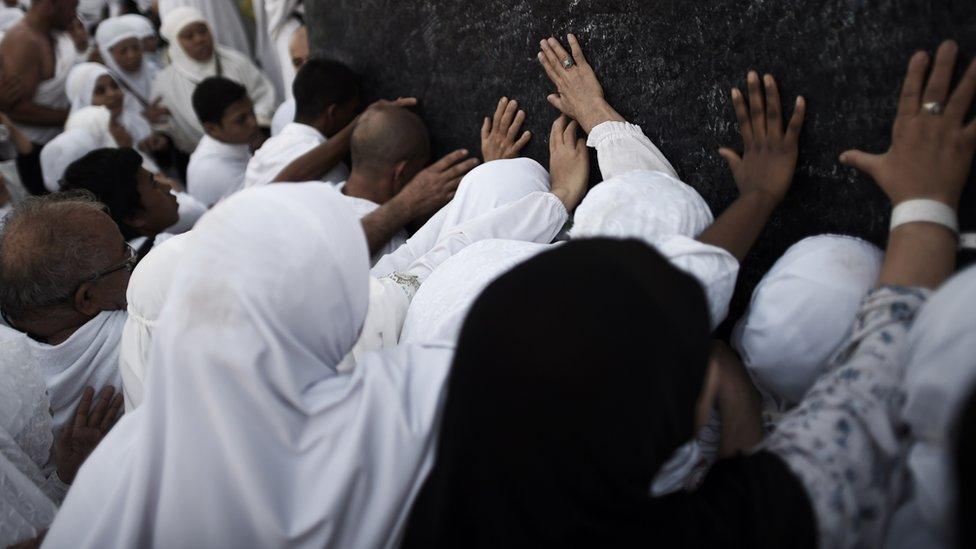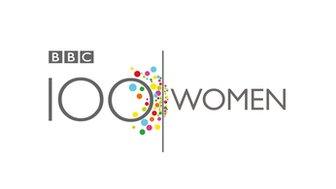100 Women: Muslim women rally round #MosqueMeToo
- Published

Muslim women are using #MosqueMeToo to share their experiences of sexual harassment during the Hajj pilgrimage and other religious settings.
Egyptian-American feminist and journalist Mona Eltahawy first talked about her experience of sexual assault during Hajj in 2013.
She is behind #MosqueMeToo.
Muslim men and women from around the world started using the hashtag yesterday and in less than 24 hours it was tweeted 2,000 times.
Allow X content?
This article contains content provided by X. We ask for your permission before anything is loaded, as they may be using cookies and other technologies. You may want to read X’s cookie policy, external and privacy policy, external before accepting. To view this content choose ‘accept and continue’.
It has gone on to become one of the top ten trends of Farsi Twitter.
Many of the women sharing their experiences on Twitter report being groped, inappropriately touched or having someone rub against them in the crowd.
It is estimated two million Muslims undertake Hajj each year, creating huge crowds in the holy city of Mecca.
Allow X content?
This article contains content provided by X. We ask for your permission before anything is loaded, as they may be using cookies and other technologies. You may want to read X’s cookie policy, external and privacy policy, external before accepting. To view this content choose ‘accept and continue’.
Allow X content?
This article contains content provided by X. We ask for your permission before anything is loaded, as they may be using cookies and other technologies. You may want to read X’s cookie policy, external and privacy policy, external before accepting. To view this content choose ‘accept and continue’.
One of the important aspects of the religion of Islam is female modesty; many women are encouraged to cover their hair and body in public in order to preserve decency and keep themselves safe from male attention or harm.
Many Muslim women are taught from a very young age that a hijab, or head covering, is their protection from harassment and assault.
Some people also believe that what a women wears, where she goes and what she does can encourage harassment and it is her responsibility to manage this.
Many women in countries such as Iran, Saudi Arabia, Egypt, and Afghanistan say they still face sexual harassment and assault on the streets, despite wearing modest dress.
#MosqueMeToo supporters say that even in the holiest of places, where they are fully covered and praying, they can be assaulted.
Allow X content?
This article contains content provided by X. We ask for your permission before anything is loaded, as they may be using cookies and other technologies. You may want to read X’s cookie policy, external and privacy policy, external before accepting. To view this content choose ‘accept and continue’.
Many Iranian and Farsi speaking Twitter users not only shared their experience of harassment but also challenged the belief that wearing the hijab keeps women safe from assault and harassment.
In Iran the hijab is mandatory. There are posters in cities and towns comparing unveiled women to unwrapped candy and lollipops attracting unwanted attention from flies.
One of the main slogans written on the walls of every office and public building in Iran says, "Hijab is not a limitation, it is your protection."
Iran's hijab protests: The Girls of Revolution Street
In recent weeks, Iranian authorities have arrested 29 people as part of a crack down on protests against the compulsory hijab.
The movement, which has been named "the Girls of Revolution Street", started after a woman took off her headscarf in central Tehran.
Allow X content?
This article contains content provided by X. We ask for your permission before anything is loaded, as they may be using cookies and other technologies. You may want to read X’s cookie policy, external and privacy policy, external before accepting. To view this content choose ‘accept and continue’.
Not everyone has been supportive of #MosqueMeToo and some people have criticised Mona Eltahawy for bringing up the topic on social media.

What is 100 Women?
BBC 100 Women names 100 influential and inspirational women around the world every year. We create documentaries, features and interviews about their lives, giving more space for stories that put women at the centre.